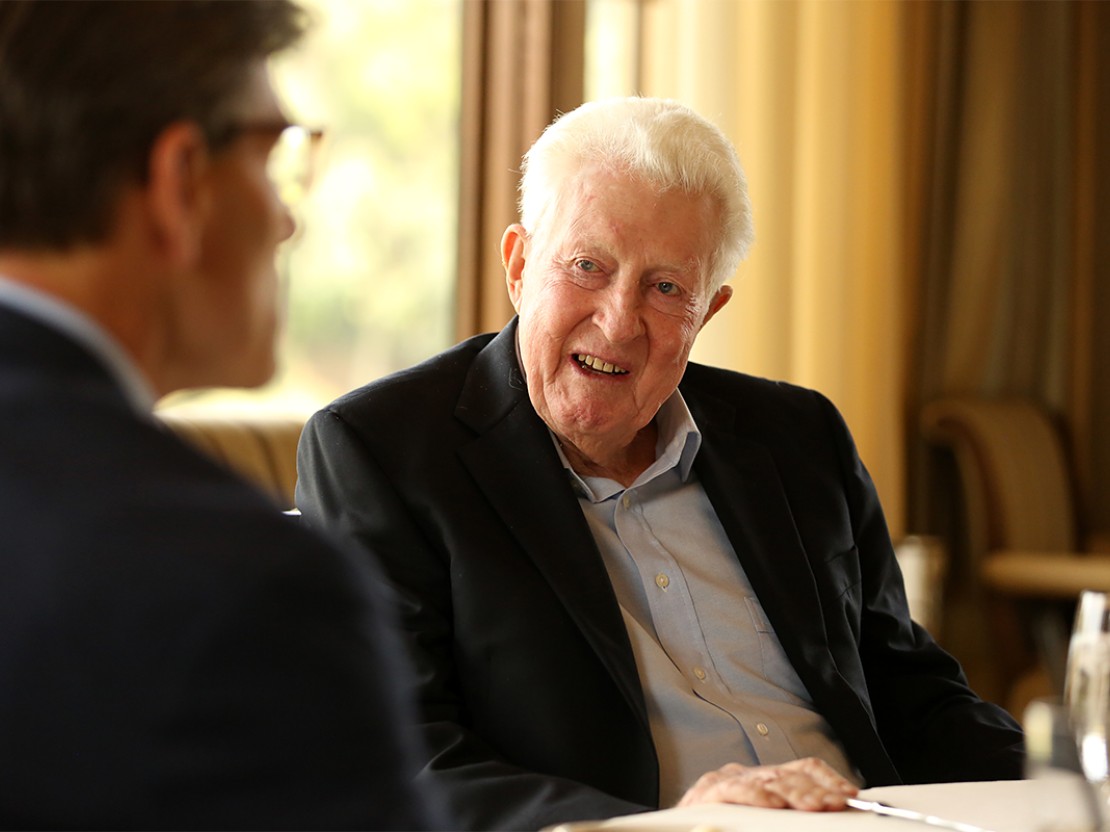By Elaine Woo
Robert L. Emett ’50 can tell you exactly where he was 70 years ago when he heard a new college was opening in Claremont.
World War II was over and Emett, a Navy seaman just back from the South Pacific, was being treated for combat-related hearing problems at the Long Beach naval hospital. He cajoled a visiting entertainer into giving him his pass so that he could come and go as he pleased.
It seemed like a good idea — until he was caught.
As punishment for his unauthorized forays, he was ordered into the brig for a few months. It was during his confinement that he received a letter from his father about Claremont Men’s College, whose founders were counting on returning servicemen to help fill classes.
“The school is being formed as we write and they will accept you,” his father wrote about the institution that 40 years later would evolve into Claremont McKenna College.
“I decided not to be in the brig again,” Emett recalled, and sent off his application When he arrived on campus in the fall of 1946, CMC, he said, was “a work in progress—they were still hiring professors.”
But the fledgling college found its footing and so did the young war veteran: He studied business administration and graduated with the inaugural Class of 1950.
Looking back, Emett, 90, says his academic record was unexceptional. But lackluster grades proved no barrier in business, where he excelled. Over the next decades, the Southern California native turned Emett & Chandler into one of the nation’s largest insurance companies, worth more than $60 million when it was sold in 1986.
An active-duty Air Force reservist during the Korean War, Emett was also active in politics and civic life. He was a delegate to three Republican national conventions and served on the boards of numerous nonprofit organizations, including the Los Angeles County Mental Health Association, the John Tracy Clinic, and the YMCA of Metropolitan Los Angeles. He was founding chairman of the San Fernando Valley chapter of the Young Presidents’ Organization.
As his business prospered, Emett became one of his alma mater’s most generous benefactors, funding scholarships and the construction of the Emett Student Center. He is a life trustee of the College with 33 years of service on the Board.
In 1994, Emett agreed to turn the scholarship fund bearing his name into a loan program to help financially challenged students pay for tuition, room, board, and fees. Over the past 23 years, the program has made $1.7 million in no-interest loans to more than 150 students. Most of the students have repaid their loans within 10 years of graduating.
Emett loans have helped students whose family income dipped when parents lost or changed jobs or faced medical emergencies and other crises. Sometimes the hardship was caused by the need to pay tuition for a second or third child entering college.
The loan program “took so much stress off me and my parents,” said Corie Hack ’19, a science management major from Long Island, N.Y. Despite scholarships and financial aid, her father, an electrician, and her mother, who referees field hockey, struggled to cover her bills as college costs rose but their incomes didn’t; this year, their tuition burden doubled when Hack’s brother entered Fordham University in New York.
“Whatever amount financial aid couldn’t help me with the Emett loan did,” said Hack, who is receiving about $8,000 a year in Emett funds.
A new gift recently announced by Emett will ensure a robust loan program for generations to come.
After his death and that of his wife, Mary Anne, the Emett estate will bequeath the College an amount estimated at $15 million to $20 million. Between $5 million and $8 million will be used to greatly expand opportunities for financial aid recipients to have paid summer internships. But the bulk of the gift—about $10 million—has been earmarked for the Robert L. Emett College Loan Fund.
“Bob’s past investment in our students has paid off handsomely—an engine of personal success and contributions back to society. He is now generously putting even more capital into a proven idea: supporting CMC students pays great returns for the College and our nation,” said President Hiram E. Chodosh.
While there are no hard and fast requirements for receiving an Emett loan, the program’s benefactor is emphatic about the kind of students who should be given priority: those with military service, and students who demonstrate a desire to improve their financial situation by holding a job on or off campus.
Grades are also an important consideration, but the preferred loan recipient is “not necessarily an A student,” Emett said. Emett loans are aimed at students with B and C averages, in part because they may have fewer resources available to them compared to top students.
But he also had a more personal reason.
“I didn’t have any As,” Emett explained.
“People who can get things done don’t always have wonderful grades. I like the ones who are aiming themselves upwards and onwards and want to accomplish something.”
